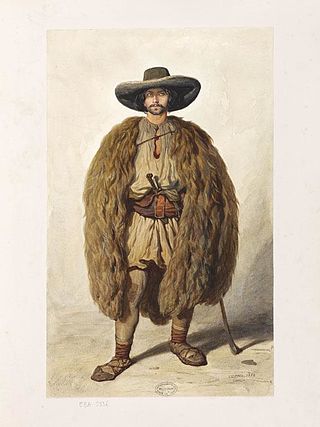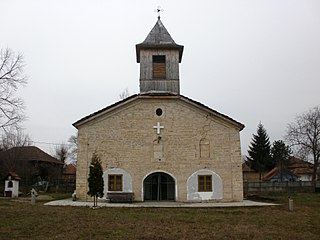See also
- Second Bulgarian Empire, formed with a joint Bulgarian–Vlach (Romanian) rebellion
- Vlachs of North Macedonia (disambiguation)
- Vlachs of Serbia (disambiguation)
Vlachs in Bulgaria may refer to:
Roman or Romans most often refers to:

Vlach, also Wallachian, is a historical term and exonym used from the Middle Ages until the Modern Era to designate speakers of Eastern Romance languages living in the Balkans and north of the Danube.

The Romanians are a Romance-speaking ethnic group. Sharing a common Romanian culture and ancestry, and speaking the Romanian language, they live primarily in Romania and Moldova. The 2021 Romanian census found that just under 89.3% of Romania's citizens identified themselves as ethnic Romanians.

The Aromanians are an ethnic group native to the southern Balkans who speak Aromanian, an Eastern Romance language. They traditionally live in central and southern Albania, south-western Bulgaria, northern and central Greece and North Macedonia, and can currently be found in central and southern Albania, south-western Bulgaria, south-western and eastern North Macedonia, northern and central Greece, southern Serbia and south-eastern Romania. An Aromanian diaspora living outside these places also exists. The Aromanians are known by several other names, such as "Vlachs" or "Macedo-Romanians".
The Megleno-Romanians, also known as Meglenites, Moglenite Vlachs or simply Vlachs, are an Eastern Romance ethnic group, originally inhabiting seven villages in the Moglena region spanning the Pella and Kilkis regional units of Central Macedonia, Greece, and one village, Huma, across the border in North Macedonia. These people live in an area of approximately 300 km2 in size. Unlike the Aromanians, the other Romance speaking population in the same historic region, the Megleno-Romanians are traditionally sedentary agriculturalists, and not traditionally transhumants. Sometimes, the Megleno-Romanians are referred as "Macedo-Romanians" together with the Aromanians.
Knez may refer to:
This article presents the demographic history of Serbia through census results. See Demographics of Serbia for a more detailed overview of the current demographics from 2011 census.

Romanians are a recognised national minority in Serbia. The total number of self-declared Romanians according to the 2011 census was 29,332, while 35,330 people declared themselves Vlachs; there are differing views among some of the Vlachs over whether they should be regarded as Romanians or as members of a distinctive nationality. Declared Romanians are mostly concentrated in Banat, in Vojvodina, while declared Vlachs are mostly concentrated in the Timok Valley, in eastern Serbia.

Vlax Romani is a dialect group of the Romani language. Vlax Romani varieties are spoken mainly in Southeastern Europe by the Romani people. Vlax Romani can also be referred to as an independent language or as one dialect of the Romani language. Vlax Romani is the second most widely spoken dialect subgroup of the Romani language worldwide, after Balkan Romani.
There are several names of the Aromanians used throughout the Balkans, both autonyms and exonyms.

The Romanians in Bulgaria, are a Romanian ethnic minority in Bulgaria. In the country, Romanians live in several northern regions, mostly along the Danube. This includes a region between the city of Vidin and the Timok river; these Romanians form a continuous community with the Romanian community in the Timok Valley of Serbia. Another region with a high density of Romanians is located between the towns of Oryahovo and Svishtov. Another goes from Tutrakan to the Bulgaria–Romania border at Northern Dobruja. There also are scattered groups of Romanians within the interior of Bulgaria, such as in Pleven or around Vratsa. The Romanians in Bulgaria are not recognized as a national minority, and they lack minority rights such as schools or churches in their own Romanian language. Many are subject to assimilation.

Vrav is a village in northwestern Bulgaria, part of Bregovo municipality, Vidin Province. Located on the right bank of the Danube at the place where the Timok River empties into it, Vrav is the northernmost populated place in Bulgaria and the first Bulgarian port along the Danube's course. The village has a Romanian population and lies 30 kilometres from the provincial capital Vidin and 12 kilometres from Bregovo.

The official language of Bulgaria is Bulgarian, which is spoken natively by 85% of the country's population. Other major languages are Turkish (9.1%), and Romani (4.2%). There are smaller numbers of speakers of Western Armenian, Aromanian, Romanian, Crimean Tatar, Gagauz and Balkan Gagauz, Macedonian and English. Bulgarian Sign Language has an estimated 37,000 signers.
Wallachia is a historical and geographical region of Romania.
The Aromanian question, also sometimes known as the "Vlach question", refers to the historical and current division of the ethnic identity of the Aromanians, mostly with ones being pro-Greek, pro-Romanian or self-identified purely or primarily as Aromanian.
The Ullah Millet was a separate millet within the Ottoman Empire. It was established by the Ottoman authorities for the Aromanians in 1905, during the rise of nationalism in the Ottoman Empire. Although the Megleno-Romanians are also sometimes called "Vlachs", the Ullah Millet was not intended for them.
Chrysus is the daimon of gold in Greek mythology.
The Aromanians in Bulgaria, commonly known as "Vlachs" and under several other names, are a non-recognized ethnic minority in the country. There are an estimated 2,000 to 3,000 Aromanians in Bulgaria, although estimates coming from Bulgarian Aromanians themselves raise this number to 6,000. They live in the Western Rhodopes, the Blagoevgrad, Pazardzhik, Plovdiv and Sofia provinces and in the city of Sofia, the capital of Bulgaria itself. More precisely, the Aromanians of Bulgaria are concentrated in the villages of Anton and Dorkovo and on the cities and towns of Blagoevgrad, Dupnitsa, Peshtera, Rakitovo, Samokov, Sofia and Velingrad, as well as on parts of the aforementioned provinces located in the Balkan Mountains. Some also live on the towns of Bratsigovo and Pirdop and on the cities of Plovdiv and Pazardjik, as well as on the Rila mountain range.
Vlachs of Serbia are a Romanian-speaking group in eastern Serbia.
Vlachs of North Macedonia may refer to: